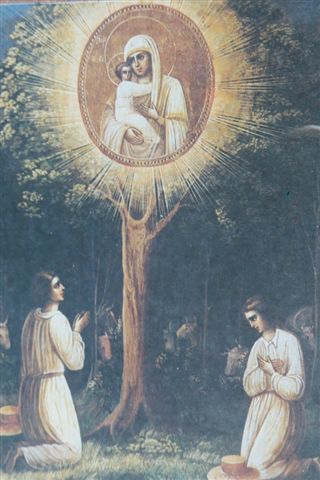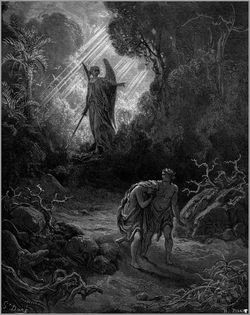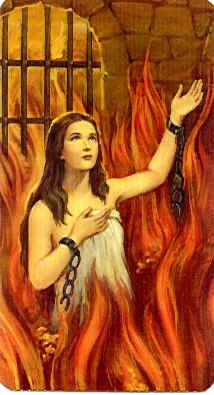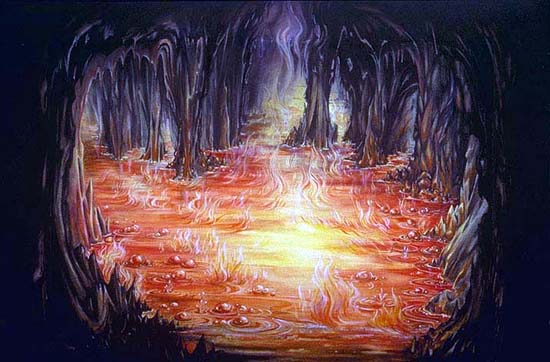|
 After
Life by
Michael Brown,
What happens when we die? How are we judged? What's it like in Heaven, Hell,
and Purgatory ? Revelations, near-death accounts, and a reawakening to what
life means! A hopeful book, a serious book, one that you and loved ones
won't forget as you take a look at the final destination: eternity. We
strongly recommend "An Unpublished Manuscript on Purgatory," available
below (revelations of nun
in purgatory). Year after year the steadiest-selling book that we have ever
carried, full of hope!
CLICK HERE After
Life by
Michael Brown,
What happens when we die? How are we judged? What's it like in Heaven, Hell,
and Purgatory ? Revelations, near-death accounts, and a reawakening to what
life means! A hopeful book, a serious book, one that you and loved ones
won't forget as you take a look at the final destination: eternity. We
strongly recommend "An Unpublished Manuscript on Purgatory," available
below (revelations of nun
in purgatory). Year after year the steadiest-selling book that we have ever
carried, full of hope!
CLICK HERE
|
|
|
|
|

__________________________________________________
BOOK THAT INSPIRED
ST. THÉRÈSE DISCUSSED HELL, ITS LOCATION, ITS REASON, AND IN THE END
WHETHER CONDEMNED ARE DEMOLISHED
[print
article]
 Where
is hell? Is it really "forever"? Or does God eventually destroy souls that
are condemned? Can a soul in hell one day find redemption? Should we
pray for those in hell?
Where
is hell? Is it really "forever"? Or does God eventually destroy souls that
are condemned? Can a soul in hell one day find redemption? Should we
pray for those in hell?
Those are certainly weighty questions, and
they are addressed -- for your discernment -- in a remarkable book we have
written about, The End of the Present World (and the Mysteries of the Future
Life), by a French priest, Father Charles Arminjon.
We have paid attention to this work because it
was strongly endorsed by a doctor of the Church, St. Thérèse the Little
Flower (who was said to even have gone into ecstasy over passages on the
afterlife).
That ecstasy, decidedly, was not over the
discussion of hell -- a topic many seek to avoid today. In a way, it is
good not to become obsessed with it: those who become attached to a morbid
preoccupation risk avoiding the Light when it is time to enter the embrace
of God (for fear of judgment) and may cause themselves an unnecessary
snare in the transition.
Remember above all
that God is a merciful God and that according to a myriad of mystics and
teachings, He always offers a final chance at the last moment -- an
opportunity (even for the great sinner, or atheist) to accept or reject
Him.
 When
there are problems, the believer most often finds himself in purgatory --
where it is said that the majority go. And once in purgatory, a soul is
"saved": it will eventually find its way into Heaven.
When
there are problems, the believer most often finds himself in purgatory --
where it is said that the majority go. And once in purgatory, a soul is
"saved": it will eventually find its way into Heaven.
But at the same time, we can never ignore
hell. That too is dangerous. We must find balance (as Thérèse did).
In Father Arminjon's view, "it would be
the height of folly to convince ourselves that if we turn our minds from
this fatal possibility and try hard not to believe in it, we shall manage
someday to avoid its rigor."
There is a peculiar resistance to the notion
of hell, he pointed out.
And rigor it is. One never escapes, wrote
Father Arminjon -- who also said that "mercy is excluded from hell" and
that "redemption cannot reach it."
If souls could escape
hell, argued the priest, there would only be three ways for that:
by a true and sincere repentance; by the power of prayers and works of
satisfaction offered up by the living; or else by destruction of their
existence -- by making the condemned cease to exist. In His mercy,
does God destroy -- obliterate -- unrepentant souls (so they do not suffer
for eternity)?
The priest argued that penance is impossible
for anyone evil enough to have earned hell, and added that they cannot
share in the "prayers and merits" of the living. Even on the day of
judgment, he posited, the Church "will not pray for those sentenced by the
just Judge to everlasting torments."
"Finally," he argued, "the sufferings of the
reprobate will have no end, and their existence will never be destroyed."
He quotes St. Gregory as saying that "it will be a death that will never
be consummated, an end always followed by a new beginning, a dissolution
that will never bring decay."
In hell, wrote
the French priest, "a thousand or a hundred thousand years no longer have
any significance: they are less than a grain of sand in the desert, or a
drop of water in the ocean."
 No
one doubts that hell is a solid doctrine. The debate sometimes arises --
surprisingly -- about whether it is forever forever (or "forever"
as a manner of speech).
No
one doubts that hell is a solid doctrine. The debate sometimes arises --
surprisingly -- about whether it is forever forever (or "forever"
as a manner of speech).
We say simply: consult the
Catechism!
Without hell, said Arminjon, there would be no
Heaven. It is the fear of hell that keeps many on the path to
glory.
What is it like?
 "To
form a better idea of their lamentable fate, let us imagine a town where
the Cains and Neros and all the other wicked men who have defiled the
earth -- men whom human justice gets rid of by casting them into dungeons
and convict prisons -- were put together. Let us further suppose that in
this town there were no police or military to prevent these wretches from
killing and tearing one another apart.
"To
form a better idea of their lamentable fate, let us imagine a town where
the Cains and Neros and all the other wicked men who have defiled the
earth -- men whom human justice gets rid of by casting them into dungeons
and convict prisons -- were put together. Let us further suppose that in
this town there were no police or military to prevent these wretches from
killing and tearing one another apart.
"Well, that would be hell such as it is
described by the prophet Job," wrote the priest.
The second punishment of hell, he said -- in
this obscure book only recently translated -- is fire.
How can hell be fire, some have asked, if
Elijah called fire down from Heaven, or God appeared in a burning
bush?
Why would Jesus use an expression like "all
will be salted by fire"? Is not fire more a representation of
refinement (purification)?
"The fire of hell
has the same principle as earthly fire, but is distinguished from ours by
its properties and purpose," wrote the 19th-century priest [see
previous article].
"The fire of earth is a gift of Providence and was created for our use;
the fire of hell is an instrument of Divine justice and was created to
punish. The fire of earth burns and consumes; the fire of hell burns
without destroying or consuming." Without fear of it, he wrote, there are
men who would trade two million years in purgatory for a seduction here.
In other words: the fear of hell is often the ticket to a good life (if we
do not obsess on it). Fear, but not obsession.
 Is
hell at the center of the earth?
Is
hell at the center of the earth?
The priest was inclined to believe so. He says
most theologians thought so. St. Gregory called it the "lowest place." The
Bible also used words like "bottomless pit." Is it really equated with a
physical dimension?
Heavy questions here! The location, says Arminjon,
is not an undeniable "truth of faith." There are many mysteries! They will
be answered when we are on the other side of the veil. With belief in
Jesus -- if we follow Him -- we don't have to fear hellfire.
We see here the final mercy! It is a hope
beyond hope. So simple. So powerful. Love always casts away fear.
Love God and through Him the people of this earth and you will not
have to fear Gehenna (or Sheol, or whatever else one calls it). St. Thérèse
did not hover upon hell. Her ecstasies came in the passage from the book
on Heaven (which we will review shortly).
 Her
mission was the ticket: love.
Her
mission was the ticket: love.
"A man's last hour finally rings; most often
it is preceded by illness; the premonitory sign of his approaching end,"
wrote Father Arminjon in The End of the Present World. "This man is
obdurate. One minute before his last sigh, God still offers to take him to
Himself and save him from the fires of the abyss. His voice has no more
strength, and his condition is desperate.
"It would be enough that -- in the intimacy of
his heart -- he should utter these simple words: 'I love you, and I
repent.'" Says Father Arminjon, "These
words would be his saving grace."
[resources:
The End of the Present World (and the Mysteries of the Future
Life]
[see also:
Sister of St. Thérèse said saint went into 'ecstasy' over
obscure book]
[Next week: what the book says about
Heaven]
E-mail this article directly
![[Mother_Of_God.jpg]](Mother_Of_God.jpg)
Return
to home page www.spiritdaily.com
 After
Life by
Michael Brown,
What happens when we die? How are we judged? What's it like in Heaven, Hell,
and Purgatory ? Revelations, near-death accounts, and a reawakening to what
life means! A hopeful book, a serious book, one that you and loved ones
won't forget as you take a look at the final destination: eternity. We
strongly recommend "An Unpublished Manuscript on Purgatory," available
below (revelations of nun
in purgatory). Year after year the steadiest-selling book that we have ever
carried, full of hope!
CLICK HERE
After
Life by
Michael Brown,
What happens when we die? How are we judged? What's it like in Heaven, Hell,
and Purgatory ? Revelations, near-death accounts, and a reawakening to what
life means! A hopeful book, a serious book, one that you and loved ones
won't forget as you take a look at the final destination: eternity. We
strongly recommend "An Unpublished Manuscript on Purgatory," available
below (revelations of nun
in purgatory). Year after year the steadiest-selling book that we have ever
carried, full of hope!
CLICK HERE Where
is hell? Is it really "forever"? Or does God eventually destroy souls that
are condemned? Can a soul in hell one day find redemption? Should we
pray for those in hell?
Where
is hell? Is it really "forever"? Or does God eventually destroy souls that
are condemned? Can a soul in hell one day find redemption? Should we
pray for those in hell?
 No
one doubts that hell is a solid doctrine. The debate sometimes arises --
surprisingly -- about whether it is forever forever (or "forever"
as a manner of speech).
No
one doubts that hell is a solid doctrine. The debate sometimes arises --
surprisingly -- about whether it is forever forever (or "forever"
as a manner of speech). "To
form a better idea of their lamentable fate, let us imagine a town where
the Cains and Neros and all the other wicked men who have defiled the
earth -- men whom human justice gets rid of by casting them into dungeons
and convict prisons -- were put together. Let us further suppose that in
this town there were no police or military to prevent these wretches from
killing and tearing one another apart.
"To
form a better idea of their lamentable fate, let us imagine a town where
the Cains and Neros and all the other wicked men who have defiled the
earth -- men whom human justice gets rid of by casting them into dungeons
and convict prisons -- were put together. Let us further suppose that in
this town there were no police or military to prevent these wretches from
killing and tearing one another apart. Is
hell at the center of the earth?
Is
hell at the center of the earth? Her
mission was the ticket: love.
Her
mission was the ticket: love.
![[Mother_Of_God.jpg]](Mother_Of_God.jpg)